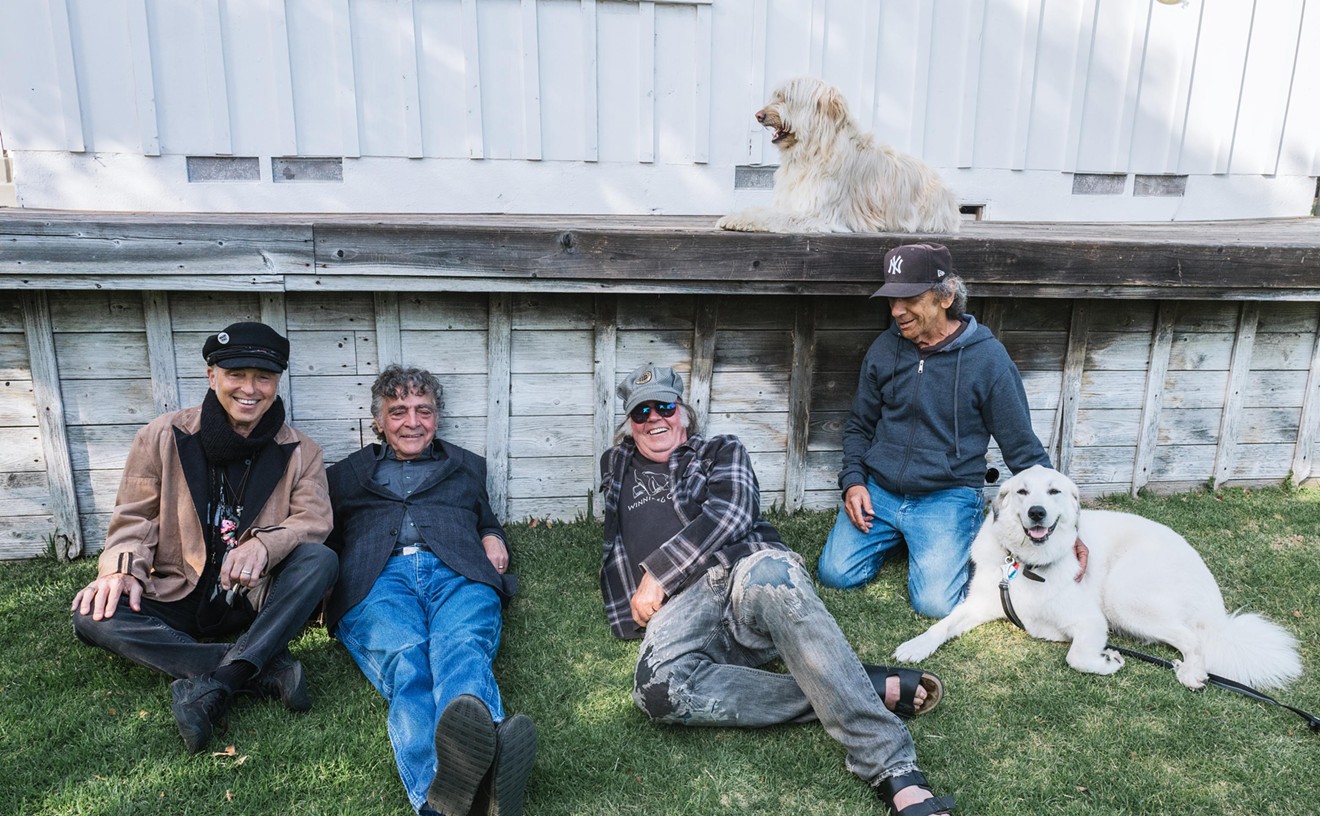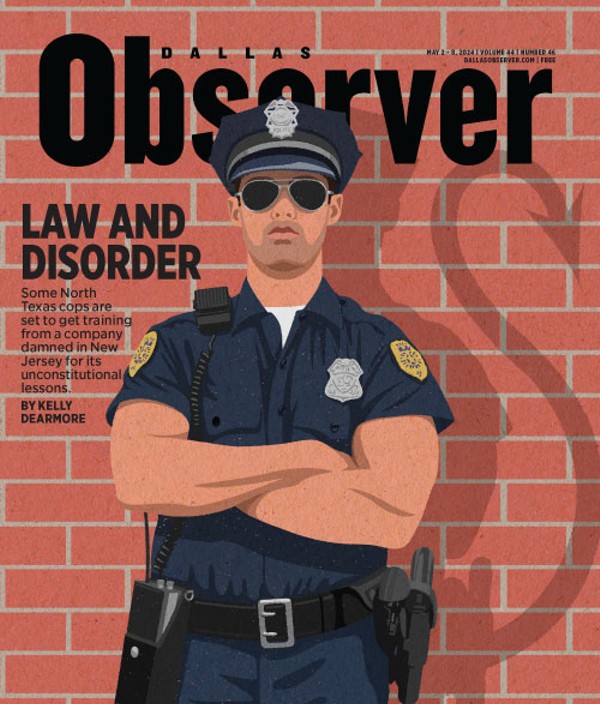They don't call him Ramblin' Jack Elliott just because he runs around with a guitar on his back.
But today, on one of the first sunny breaks from a torrent of West Coast rain, the spirited old cowboy folksinger is cooped up in a Point Reyes, California, restaurant, an hour north of San Francisco and near his home in the population-50 town of Marshall. Outside, the hills near the coast look like smooth, moss-covered river rocks. Inside, Elliott sets aside a stitched-up taupe cowboy hat and works on a cup of black tea. He's here to talk about Friends of Mine, a new album of duets with Guy Clark, Tom Waits, Emmylou Harris, and others. Jan Currie, his fiancee of several years, looks on. ("We got engaged," Elliott says, "in the Ace Hardware in Eureka, Nevada, which is a good place to buy a ring, because it's sitting on top of a gold mine.")
As Elliott talks, Currie occasionally pats his blue jeans to stop a tale from splintering into a half-dozen tangents. "I'm a storyteller," he says matter-of-factly. "I've been accused of being a poet, but I haven't explored that."
Ramblin' Jack Elliott is 67 and still plays 50 live shows a year. He's Northern California's greatest folk minstrel and one of its finest storytellers. Inseparably, he's also a man alive, the kind of guy who loves to whittle, rope, tie knots, sand wooden boats, work cattle, drive trucks. Others call him the bridge between the old, weird, prewar American folk music and its early '60s coffeehouse cousin. For his part, Elliott calls himself "a goddamn good picker and a goddamn good driver."
"I don't like travelin'," Elliott says. "I like driving around in an old diesel truck, but flying and airports and airlines and eating all that bad food and listening to them high -school girls on speed chewing gum and talking into the microphone telling me to buckle my seat belt--I don't like to be told what to do."
Born Elliott Charles Adnopoz in Brooklyn in 1931, Elliott assumed the Ramblin' Jack handle after he ran away with a rodeo as a young teen. (He was Buck Elliott in the interim.) After picking up a couple of guitar chords around the rodeo and then a stint in Greenwich Village folk-music circles, Elliott met Woody Guthrie--one of the most important figures in the music of this century, a troubadour, an honest poet, a writer of more than 1,000 songs, a follower of and a believer in folk, and the man Elliott would be associated with for the rest of his life.
In the year and a half Elliott lived with Guthrie, and the few years that he would travel around the country with him, the young man learned everything about playing guitar and singing from his senior: the old cowboy songs and the Dust Bowl ballads, how to flat pick, and how to sing simply. (He also acquired a couple of Guthrie's bad habits: Elliott, too, went through a handful of wives and never really learned how to deal with a record company.) In 1955, Elliott set out on his own; soon after, Guthrie drew back into illness, fighting the decade-long bout with Huntington's chorea that would end with his death in 1967.
Elliott was one of the first American folksingers to tour England and Europe; he was rewarded with appreciation from Germans and Danes and Englishmen hungry for American traditionals. (Ethnomusic-ologist Alan Lomax saw him at that time and told the folks back home that Elliott was his favorite young singer.) By the time he got back to the States and the center of the Village folk scene, he was still singing Guthrie songs: His first American platter, recorded in 1960, was Jack Elliott Sings the Songs of Woody Guthrie. On that record, his version of "Hard Travelin'"--his "first favorite Woody Guthrie song"--played exactly like the version Guthrie laid down for famed folk producer Moses Asch years earlier.
"For years I did Woody Guthrie songs exactly the way that Woody did," he says. "And I got a lot of criticism from his friends and admirers. Some of them might have loved him as much as I did, but they didn't like how I was being a perfect mimic, aping Woody Guthrie down to the very last movement and gesture and facial expression. I'm sure they found it unnerving. Perhaps I owe them an apology, but I've changed the way I do a lot of Woody Guthrie songs."
"Hard Travelin'," which Elliott distinguishes from Guthrie's plain treatment by giving more heart, more emotion, and a pinch of shtick on the new Friends of Mine, is a good example. "Buffalo Skinners," a traditional that Guthrie used to do, is even better. Like most songs Elliott plays, it's got a back story. He had heard Guthrie play the song, but Elliott couldn't figure out the part that gives the song its driving sense of doom: You had to play the tune in straight major chords, but sing it in a minor key. He asked Guthrie to help him out.
"He was offended by the concept of teaching," says Elliott. "He told me that he once asked Leadbelly what Leadbelly was doing on a guitar one time. Leadbelly replied, 'I ain't gonna show it to ya, but you welcome to steal it if ya like it.' He wasn't even going to play it or show it to me. He said, 'It's on the record, Jack.'"
Elliott "listened to the record a hundred times" and learned the song and its story, about a group of cowboys who kill their boss after he lures them out West and then screws them out of their pay. Elliott sang "Buffalo Skinners" the same way Guthrie did for 10 years, then slowly started to make it his own. Between now and then, Elliott's picking has become more forceful and confident, but the major difference is that Elliott gives the song two additional minutes. The added length lends the song a sense of wide-open space that connects it to the New Mexico landscape where the story takes place. At the end of the song, Elliott quietly howls into the microphone. It's twice the song Woody Guthrie once recorded.
Regardless, it's not fair to compare Elliott with Guthrie; they're really not playing the same game. Woody Guthrie was a troubadour. The original troubadours were 11th- to 14th-century poets from the South of France. They wrote about love and chivalry in the language of the people and traveled around spreading their music. Ramblin' Jack Elliott is, by contrast, more of a minstrel. He doesn't write his own songs (much); what he does is entertain through others' songs and his mastery of the exquisite craft of interpretation. Like every good minstrel, Elliott maintains a quiver of songs. South Coast, a 1995 record that won him a Grammy for best traditional folk record, is a fairly representative collection: Jesse Fuller's "San Francisco Bay Blues," Tim Hardin's "If I Were a Carpenter," and "Mean Old Bedbug Blues," made famous by Bessie Smith.
That record, released on the Minnesota-based folk label Red House Records, marked Elliott's return to the recording studio after a 26-year hiatus. It wasn't that he couldn't record; it was that he refused to. Elliott says that throughout his career he's released 40 records for more than 10 record labels--five of which were "totally gonzo" outfits, as he puts it--and has yet to see more than a couple of dollars for his trouble. "Didn't make records for 26 years," he says. "Total mistrust, because I'd been ripped off so many times by record companies that I never had any hope of ever getting a square deal."
Eventually Elliott gets around to talking about the songs he recorded for his new album on Hightone Records. Tom Waits wrote the pained "Louise," a timeless-sounding tune about a jilted lover, just for the record. "If you didn't know it, you might think it's some old song," says Elliott, who croons an eerie Louvin Brothers-style harmony to Waits' lead. Bob Weir had to learn how to play and sing lead on "Friend of the Devil"--a tune he had spent 25 years backing Jerry Garcia on--in order to perform it with Elliott. Joe Ely (whose wife, Sharon, makes that delicious posole) spent all night teaching Elliott "Me and Billy the Kid," but the latter turned the tale into a talking blues. The climax of the amusingly unsentimental story, the moment when Billy the Kid gets it, is a punch line to a joke set up in the refrain of the chorus--"He wore his gun all wrong." Elliott just thinks it's funny. Elliott once sang Merle Travis' "Dark as a Dungeon," which he does here with Guy Clark, in the forward torpedo room of an attack submarine off the coast of Hawaii.
He was never in the service, so that's another story entirely. And by the way, did Elliott ever mention how great Ray Charles was? Or the time he went to bull-riding school when he was 47?
At this point the stories are part of the teller's being. When he wasn't recording, Elliott toured endlessly, probably most notably with Bob Dylan on the Rolling Thunder tour. That experience means that now, onstage, Elliott acts with complete ease. He leans back on his heels to play guitar, then hunches into the microphone to sing.
"I'd say about half of the shows that I've done, I started the show with absolutely no list of songs," he says. "I just start talking about what happens on the way to the gig. People just start laughing. No matter how boring it is, they always start laughing."
They're laughing, of course, because Elliott's keeping up his end of the performer-audience contract. Elliott knows that good stories are all in the telling. "You can tell a good story about anything in the world," he says. "Say you want to tell a story about some guy's great eyesight." His voice changes. "See that fly on the telephone pole across the street?" Pause. "He's got a piece of bread in his mouth." Pause. "Whole wheat."
"Now you've made the audience laugh," he says. "They're ready to hear anything you have to say. It's just like roping. You have to whirl your loop properly. Get that nailed down, because the next thing you're going to do is throw the loop. If you didn't whirl it properly, it's not going to be open, a nice round circle, when you throw it. When you release it, the only thing you have to do is throw it in the right direction, at the right speed, at the right time, so it gets around the calf's neck or the steer's hind foot. And there's this wonderful moment when the rope goes around the steer's horns, and you got yourself a steer on the end of your line. It's not very hard work.










